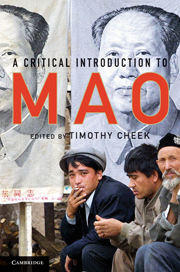Book contents
- Frontmatter
- Contents
- List of Illustrations
- About the Contributors
- Preface
- Acknowledgments
- Timeline of Twentieth-Century China
- Maps
- Part I Mao's World
- 1 Mao, Revolution, and Memory
- 2 Making Revolution in Twentieth-Century China
- 3 From Urban Radical to Rural Revolutionary: Mao From the 1920s to 1937
- 4 War, Cosmopolitanism, and Authority: Mao from 1937 to 1956
- 5 Consuming Fragments of Mao Zedong: The Chairman's Final Two Decades at the Helm
- 6 Mao and His Followers
- 7 Mao, Mao Zedong Thought, and Communist Intellectuals
- 8 Gendered Mao: Mao, Maoism, and Women
- 9 Mao the Man and Mao the Icon
- Part II Mao's Legacy
- Appendix: Selected Further Readings (Annotated)
- Index
- References
3 - From Urban Radical to Rural Revolutionary: Mao From the 1920s to 1937
Published online by Cambridge University Press: 05 August 2012
- Frontmatter
- Contents
- List of Illustrations
- About the Contributors
- Preface
- Acknowledgments
- Timeline of Twentieth-Century China
- Maps
- Part I Mao's World
- 1 Mao, Revolution, and Memory
- 2 Making Revolution in Twentieth-Century China
- 3 From Urban Radical to Rural Revolutionary: Mao From the 1920s to 1937
- 4 War, Cosmopolitanism, and Authority: Mao from 1937 to 1956
- 5 Consuming Fragments of Mao Zedong: The Chairman's Final Two Decades at the Helm
- 6 Mao and His Followers
- 7 Mao, Mao Zedong Thought, and Communist Intellectuals
- 8 Gendered Mao: Mao, Maoism, and Women
- 9 Mao the Man and Mao the Icon
- Part II Mao's Legacy
- Appendix: Selected Further Readings (Annotated)
- Index
- References
Summary
This chapter begins the narrative of Mao Zedong's political career and covers the first half of his long life. At the end of the period covered by this chapter, Mao had become the leader of the remnants of a party that had just survived its second virtual extermination and had to adjust to the new environment and people of northwest China, as well as to the new threat of Japan. It might seem, therefore, that the “early Mao” would be interesting only as a prelude to his later career – the time when he was waiting in the wings of history's stage.
But Mao's successful leadership of China's rural revolution was not a lottery ball coughed up by chance or by deep historical processes. Essentially, the foundations of Mao Zedong's political thought were laid by 1937. Although his immediate problem in 1937 was war against Japan and consolidation of his leadership rather than class struggle in the villages, rural revolution returned as the main driver of the Civil War with the Guomindang from 1945 to 1949.
The task of this chapter is to analyze the development of Mao Zedong as a political actor from his initial socialization into the total chaos of early-twentieth-century China through his survival-driven origination of rural revolution to his reformulation of revolutionary leadership in the aftermath of the Long March. Despite the desperate situation in 1937, Mao faced his new beginning in Yan'an with a confidence built on the solid foundation of his earlier experiences.
- Type
- Chapter
- Information
- A Critical Introduction to Mao , pp. 61 - 86Publisher: Cambridge University PressPrint publication year: 2010
References
- 4
- Cited by



